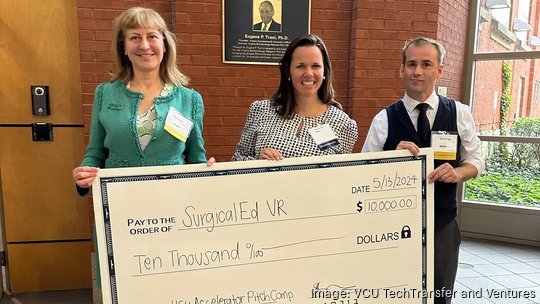
SurgicalED VR, led by Virginia Commonwealth University urogynecologist Lauren Siff, recently won a pitch competition presented by the Richmond university’s first-ever startup accelerator program for faculty members.
SurgicalED VR offers a surgeon training system that combines virtual reality and software that creates an experience of touch, or haptics. It allows trainees to practice the performance of blind procedures — those performed by feel instead of sight — and can score a person’s performance. The system offers a safe and cost-effective training without the need for cadavers.
Siff, the chief of gynecologic surgery and urogynecology at Central Virginia VA Health Care System and adjunct associate professor in the Department of Obstetrics and Gynecology and the Department of Surgery at the VCU School of Medicine, was one of five VCU faculty members to present their projects. The SurgicalED VR team was awarded $10,000 and in-kind services to develop its technology, test it in academic medical centers and ultimately bring the product to market.
MagnaShield, a VCU College of Engineering team led by assistant professor Radhika Barua, claimed second prize at the pitch competition for its work developing lightweight materials to stymie cybercriminals who use electromagnetic interference. The company was awarded $5,000 and in-kind services at the pitch competition, which was held May 13.
The other participants included:
- PatternWave Solutions, which is using machine learning to build better predictive models in health care.
- MCMNtech LLC, a drug discovery platform focused on membrane proteins as drug targets.
- ExaLyte, the maker of an at-home calcium monitor for patients.
The 10-week accelerator program is led by the VCU TechTransfer and Ventures team, which is responsible for protecting university-generated intellectual property and facilitating its commercialization. Last year, TechTransfer and Ventures filed 165 patent applications, received 26 patents, executed 29 licenses and brought in $3 million in licensing revenue. It also granted 12 licenses to startups.
VCU also recently announced it was doling out $242,000 in grants from its Commercialization Fund to six researchers to support bringing some of their medical-focused inventions to the market.